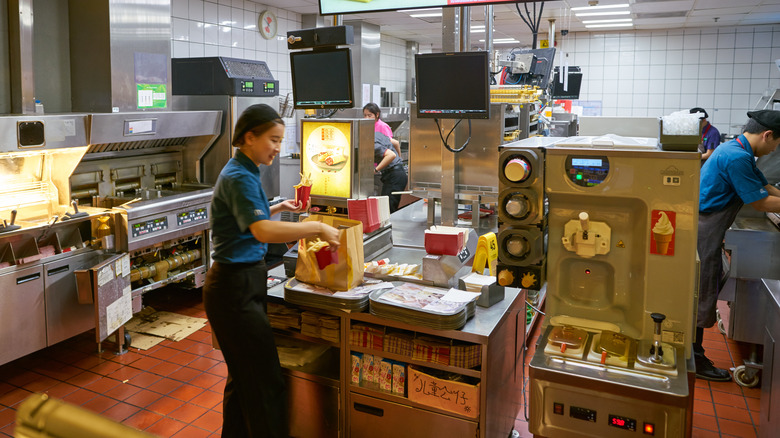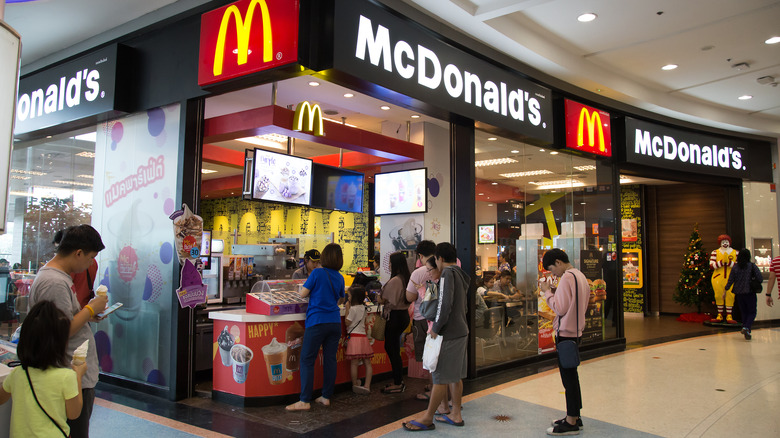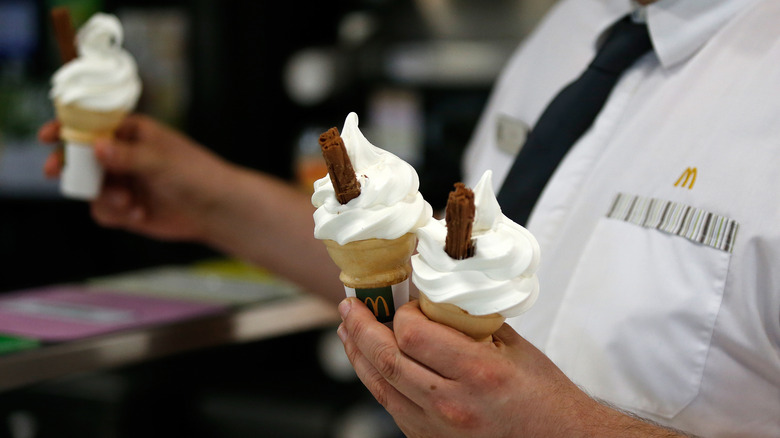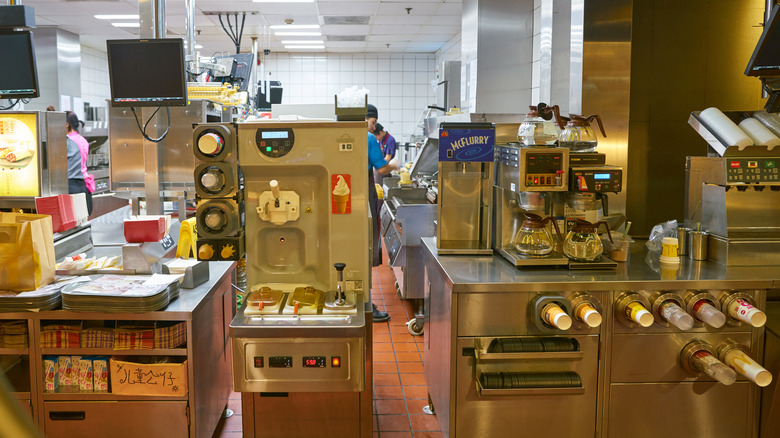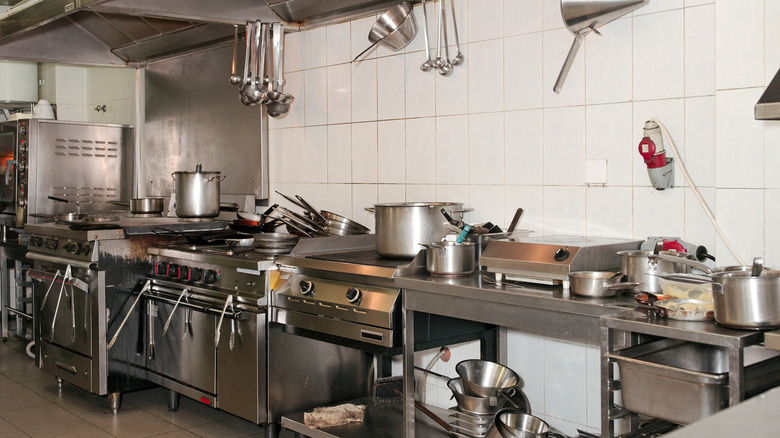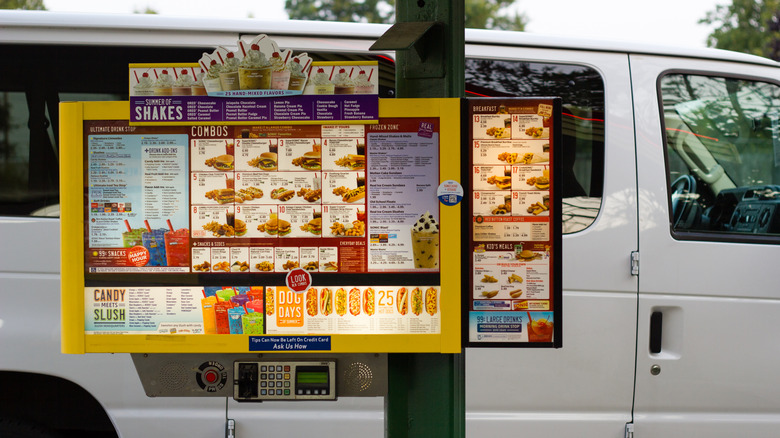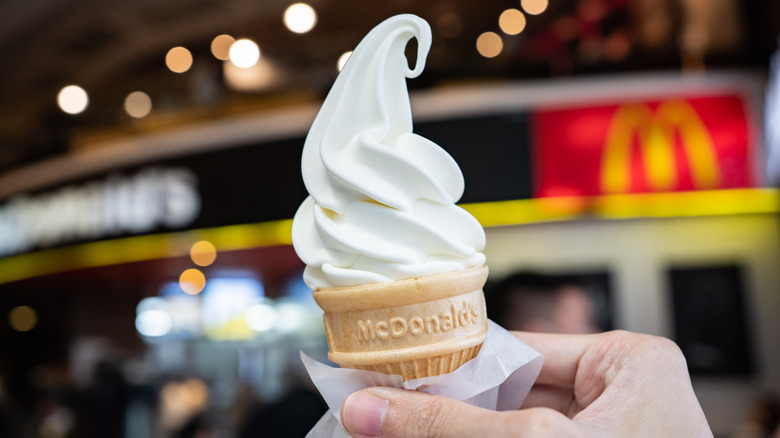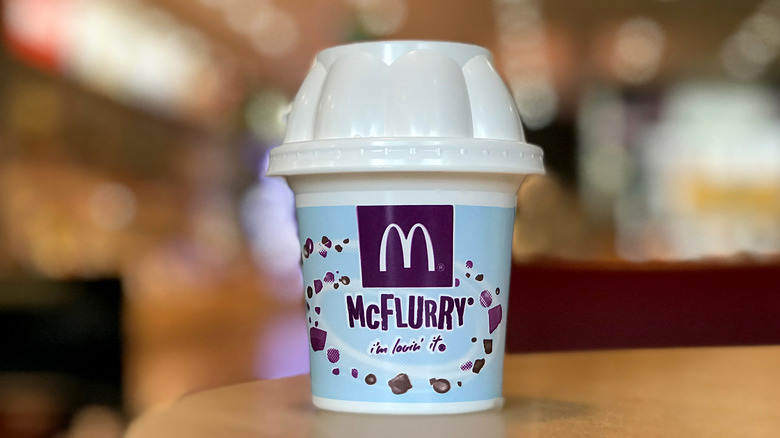What To Know About McDonald's Ice Cream Machines, According To A Pro - Exclusive Interview
Out-of-service ice cream machines at McDonald's are plaguing customers and restaurant owners alike. As a result, McDonald's ice cream machines have been making a lot of news lately. The machines are down so often that a Twitter user created the site McBroken where they "reverse engineered McDonald's internal api" to find out how many machines are broken across the U.S. and Canada at a given time. As of writing, 12.38% are currently down. The Federal Trade Commission (FTC) is looking into why its machines are broken so often, according to NBC4i.
Earlier this year, a start-up called Kytch made waves by claiming the Taylor Company, producers of McDonald's ice cream machines, stopped franchises from using Kytch's internal monitoring systems, designed to help franchises find and fix ice cream machine issues on their own. Kytch filed a lawsuit claiming Taylor tried to steal its trade secrets to produce a similar device. Vice found a judge issued a restraining order against Taylor in the summer of 2021 to prohibit the company from using, copying, or sharing information about the diagnosis devices. Taylor called Kytch a "parasitic device" based on Taylor's own intellectual property, according to Business Insider.
To find out what's going on with McDonald's ice cream machines breaking (is it really that bad?) Mashed spoke with Daniel Estrada, CEO and Co-founder of 86 Repairs — a tech platform that manages and streamlines equipment maintenance and repairs for the restaurant industry. Estrada offered insight to the impact, if McDonald's machines break more than other fast-food brands, and if there's really a "secret menu" repair technicians can unlock.
Taylor Company ice cream machines are the McDonald's standard
So, before we get into why these machines always seem to be broken, what can you tell us about the ice cream machines that are found specifically in McDonald's locations?
Sure. McDonald's, like many franchises, has a set of equipment across every different equipment category, whether it's an ice cream machine or a fryer, that they recommend or in some cases dictate their franchisees purchase. There's a limited set of equipment that you can buy if you're opening a new McDonald's restaurant in each of those categories. Today we're aware of two manufacturers that you can buy on the ice cream machine side. You can buy Taylor equipment, which is the source of a lot of the news we've been hearing recently, and there's a company called Carpigiani that also makes ice cream machines that McDonald's operators use.
What makes McDonald's ice cream machines different from others that you find in other retailers?
Well, I don't know that there's as much of a difference other than the fact that from what I've seen, the machines that are manufactured by Taylor are made specifically for McDonald's. There's a specific model of machine. I think it's the C602. I'd have to double check on that [Editor's note: C602 Taylor digital ice cream machines are standard in a majority of McDonald's]. But that's a Taylor ice cream machine that's made specifically for McDonald's, and the cleaning cycles have caused some problems with that machine.
When we look at our data, there are a couple of common reasons that those machines fail. The common kind of symptoms or issues that we see with those are temperature issues. So, the machines either running too cold or usually too warm, too hot, which is really important with any kind of dairy-based product for food safety reasons. You have to make sure that the product is at the right temperatures. Then, the other thing is an error code being shown on the machine. So, usually that's related to a cleaning cycle that didn't complete properly and again, from a food safety perspective, really important that restaurants pay attention to those and get that right.
McDonald's ice cream machines need to be cleaned or people can get sick
Will you then walk our readers through what the process is for what it takes to fix one of these machines?
It really depends on what the problem is. Oftentimes what we've seen is these temperature issues and some of the error codes that are being thrown by the machines have to do with the cleaning cycles of the machines not having completed properly. The machines go through a cleaning cycle. I think it takes about four hours and that cleaning cycle gets initiated by the staff. If the cleaning cycle fails, the machine will essentially throw an error code and it will say the machine can't be used until it's looked at by a technician. The reason for that, again, tends to be food safety issue. Making sure that the machine has been cleaned thoroughly, so you don't have old dairy product, right, dairy-based product, like ice cream, sitting in that machine and potentially making people sick. That cleaning cycle, if it doesn't complete correctly or fully, that machine needs to have some service, needs to be looked at and essentially rerun.
Now, the question is should the staff be empowered to do that themselves or not? I don't have an opinion on that. The question really comes down to whether the operator, the customer in this case, McDonald's, it finds it acceptable that they have to send service as frequently as they do for those machines.
I will tell you again, not to make a sexy story less sexy, but ice cream machines in our data are only the 11th most serviced piece of equipment in a McDonald's. So, yeah. I think really the interesting angle here is that ice cream is such a popular menu item and it's, I would assume, I don't know this for a fact, but I would assume that it's a pretty high-margin menu item in a McDonald's. I think there's a lot of attention on this because of the popularity of those items. It's become a meme, a sensation online that these machines are constantly broken. But when you look at the full set of repairs that a restaurant has to go through and manage the real data shows us that it's only the 11th most common issue. What we typically find to be more common are things like HVAC problems, plumbing, things like that.
Just to be clear, your company is specifically involved in fixing the Taylor ice cream machines that have been making news as of late?
So, 86 Repairs is a subscription service for restaurants. We manage the whole repair and maintenance process for restaurant groups. Whenever there's a problem in one of the stores, our customers send us a text and we manage the whole process of getting it fixed. It could be an ice cream machine. It could be a fryer, a grill, a walk-in cooler or anything that they need to run their operation inside the building, so facility or equipment. And so, we are not a service company. What we do is we help the customer troubleshoot those issues to avoid unnecessary service visits. There's a way to fix that machine without having a vendor come out and charge your service visit, we will do that with the customer. If they do need a vendor, then we'll dispatch their preferred vendor.
Thank you. That makes sense.
Yep. It's a little bit different.
How many locations does your company service?
We have just under a 1,000 locations that we work with.
Must keep you pretty busy.
It does. It does.
The reasons why ice cream machines break depends on who you ask
You mentioned the cleaning cycle might fail. Could you say maybe why some of these breaks happen and is it maybe the machines or users or somewhere in between?
I think it depends who you ask. I think if you asked a manufacturer there are often cases, or if you ask even a repair company, there are often cases of user error in how they use the machines. We do see with some equipment that when the cleaning cycles aren't done as regularly as they should be or when there isn't the preventative maintenance on the equipment as regularly as there should be, that can cause problems and cause the equipment to fail more frequently. I don't know that's the case here. We really don't have data on whether there's a user error here that's driving these changes or not, so I can't speak to the Taylor machine specifically, but that does happen in other categories.
I think you also see where the equipment can [have] different design flaws in equipment or there can be flaws in the way that the kitchen is laid out, right? With McDonald's, they paid very close attention to this. McDonald's is a very, very good restaurant operator. It's one of the reasons they're as big as they are and as successful as they are that they have a very tight operational process and the way they designed stores, the way they operate stores, down to the details they manage and their operating checklists. It would be surprising to me if [design] were part of the issue here. But, they are dependent on their partners like Taylor to manufacturer equipment for them. When you're that size, you often have custom equipment manufactured for you that only exists in your restaurants. It's very hard to say where those issues are actually originating.
Again, I'm sorry, that's not a smoking gun.
Fair.
But that's the truth.
Location is biggest factor for how quickly an ice cream machine can be fixed
It sounds like it definitely varies, but how long would a typical service visit take on a broken machine?
It really depends on a couple of factors. I think the biggest, the thing that we measure that's the most impactful, is the total downtime, so what I would call the average resolution time of a service incident on a specific machine. That's most important to the operator because even though I might pay, say if the tech is on site for eight hours and I paid for eight hours of service, but the machine was only down for nine, that's a pretty good turnaround. The operators [are the] most concerned with that machine being back online. So with a product like ice cream, that likely is a pretty high-margin menu item, that downtime is more valuable than whatever the money would be that you would spend maybe on a longer service visit.
That being said, what really affects this is number one, where the store is located. If you're in a dense, urban area where there's more access to service companies, there's a bigger concentration of service companies or repair companies, they can get on site quickly in many cases and solve the problem. If you're in a rural area where the service company has to drive in some cases, two, three hours to get to your restaurant, that can cause big delays in getting service. So, one factor is geography of the restaurant.
Another factor is the availability of parts. If there's a replacement part needed, whether the tech who shows up has those parts on the truck or not. There were a ton of supply chain issues, which I'm happy to talk more about if that's interesting. Ton of supply chain issues right now with getting those replacement parts. I don't know specifically on the Taylor machines whether that's been an issue, but I know it's been an issue with a lot of other categories of equipment so that can be another factor. If you have a tech come diagnose the equipment, say, "I need this part." They have to come back tomorrow. They overnight the part — part shows up — [then] they have to come back tomorrow and install it. Well, if that parts back ordered for two or three weeks, you might be down for weeks.
That's something that we try to help our customer manage is understanding what the problem is so that the tech can come prepared with the correct part rather than having to make multiple visits. These are the kinds of things that are very hard for restaurant operators to coordinate because they don't have this data and this attention to detail that 86 Repairs is managing.
Only authorized service providers can fix McDonald's ice cream machines
The Taylor Company has also been making waves because of a legal battle with a startup that was running basically a diagnostic device to help people fix their broken machines. Why is it important that these authorized repair companies need to come and repair these machines?
I'll give you a few perspectives on it. One is a company like McDonald's has an incentive to have authorized... sorry, let me say that differently. A manufacturer like Taylor, regardless of whether they're doing the service or a third-party company in their service network is doing the service, a manufacturer like Taylor has an incentive to have an authorized network of service providers because it ensures that they are able to put those service providers through the appropriate training that they need on the equipment.
Typically, those technicians get trained on equipment [by] company manufacturers before they're part of the service network. Or at least if they haven't been trained, there's some sense of accountability there, right? The manufacturer is sending warranty business when the equipment breaks under warranty. The manufacturer is sending that warranty service business to those repair companies because they believe those companies to be qualified, or they've been trained.
This is a very common practice in the industry. Taylor isn't doing anything differently than other vendors have done. But the one difference in this situation is that Taylor has a workforce of technicians that they dispatch and so they're actually doing the work on their own equipment and they have a service contract with McDonald's. That's the other part of this that, again, isn't particularly nefarious. It's just a pretty standard practice in the industry that McDonald's as a franchisor, or any restaurant operator really, has an incentive to have preferred vendors that they're working with for service because it allows them to have a leverage with those vendors and be able to continue getting good response times, hopefully lower costs from that vendor, having vendors that understand their equipment, right?
And so that's the thing that I think folks miss in this conversation is that these are pretty standard business practices. Now, we can argue about conflicts of interest and there's certainly a road to go down there, but generally speaking, this is a fairly common thing that happens in the industry.
Maintenance is a huge pain point for McDonald's owners
It sounds like your company, 86Repairs, is really looking at the full picture by measuring some of these data points and looking at the detail as well.
They are.
Could you share a little bit more of what you've measured and what you've noticed through working across the country with these different providers?
We've noticed some of the things I just talked about. The big difference geographically and how much it costs to get things fixed. What the response times are for service companies, what the average resolution times are, like I talked about. We measure a metric called 'meantime to resolution,' pretty self-explanatory. We measure things like first-time fixed rates with service companies. So, how often was the problem resolved on the first visit rather than having to have repeat visits or having something that a service company said was fixed and really wasn't and needing a second or third visit. We track all of that kind of data. Then, we also track cost and quality data of vendors. So, how expensive are they on an hourly rate basis, but more importantly how expensive is it to get a particular vendor to solve a particular problem for you?
One of the reasons that repairs and maintenance have been such a hard, hugely painful topic for restaurant operators is that it's very hard to compare, for example, two vendors based on their hourly rates because somebody who charges you $95 an hour, but takes twice as long to do the repair may actually be more expensive than somebody who charges $125 an hour, but takes half the time. This kind of quality and costs dynamic is really important. Operators have never had insights into how often things break, how much it costs to fix them, who the most qualified companies are to do that work in different parts of the country. Especially when you're a big operator, if you're a McDonald's franchisee and you operate in multiple states, you've got a lot of pain around this because you have to manage all these different vendor relationships, and you don't have any good data about what's actually breaking and what those costs look like.
These are all factors that I think go into managing repairs in a proactive, strategic way. Whereas in the past, they've always been managed in a very reactive way. Repairs and maintenance are not a problem for you until suddenly they're the biggest problem that you have to deal with.
McDonald's machines break more — but also makes more ice cream
Excellent point. So, your company also works with service providers that fix ice cream machines at, say, Sonic Drive-In. A lot of attention has been paid to McDonald's, but do you find that they really break more often than at other locations or brands?
We have some data about this. Let me take a look. We see that the incidents of repairs on ice cream machines at McDonald's is a little higher than the incidents of repairs of ice cream machines at other customers. But the big asterisk I would put on that is other customers don't do the same kind of volume on ice cream that McDonald's does. For example, the comparison that we're drawing here, I'd have to dig into it a little bit and to compare Sonic or Arby's or something, which we could certainly do if you were interested in that data. But if I compare it to other customers who have ice cream machines, but don't do as much volume on those, that could be skewing the metric.
Across all restaurants, ice cream machines are the 11th most common repair issue, [at] McDonald's they're the 11th. There is some difference there, but again it probably has to do with the volume because what we see more than equipment age, more than anything else that affects how often something is being repaired — even the quality of the equipment — the frequency, the utilization of that equipment is the most important factor in determining how often it's going to have to be repaired.
86 Repairs serviced over 10,000 pairs on McDonald's ice cream machines this year
You touched on the scope of the problem, but how many McDonalds ice cream machine repairs are there each year?
I'd have to extrapolate. I can tell you on ice cream machines, so this would include other manufacturers. I mentioned Carpigiani and Taylor are the two big ones. But we had, let me just do some quick math here. So that's about ... I think there's about 14,000 McDonald's restaurants in the U.S. and based on the subset that we work with... based on the frequency for this year, I think it's safe to say across the U.S. there probably been over 10,000 repairs on ice cream machines this year.
Do you know what the estimated loss of revenue might be from a broken ice cream machine or maybe another popular piece of equipment?
Unfortunately, I don't. ... Again, the factors I'd be looking at would be the average comparable sales during that same time period that the equipment was down. Most operators can tell you what their sales were, even down to a particular menu item, during a certain time. So if my machine was down Thursday to Friday this week, what were my Thursday to Friday ice cream sales last week. And that would give you basically a rough sense. We're seeing an average of so far this year about 1.4 repairs on an ice cream machine. For the course of a year, you're probably talking two to three repairs, probably two is a safer number. Two repairs on that equipment.
Taylor ice cream machines are complicated, not secret
Do the Taylor machines really have a secret menu that tells repair techs what's wrong with it?
I wouldn't call it a secret menu. I would say that a Taylor and other manufacturers do make their service manuals available. You can get them. I think the reason there's a perspective in the industry that there are secrets to this equipment is because of what we talked about earlier. The reason this feels so secretive is because repairs have always been a black box for restaurant operators, and it's not their fault. This is a hard problem, but it's just like if you take your car to the mechanic and they tell you that you need to have your brakes replaced. It's very hard. You have to trust that mechanic that they're giving you the right information because I don't know about you, but I'm not an expert in repairing cars. It's the same situation.
Problem is it's magnified for a restaurant operator. A restaurant has a lot more equipment than most people realize. McDonald's restaurant has 80 [to] 90 pieces of equipment just in the kitchen. And all of those are critical to serving guests. If one of those pieces of equipment is down it has a big impact on the operation. That's why this is so painful and why I think people jump to the conclusions that there's something nefarious going on here. There are menus that you can access if you have the right service manual. Of course, it can be hard to find those for a lay person who's not familiar with the topic, but they're out there.
One last very important question. Do you prefer vanilla or chocolate?
For a McFlurry, vanilla.
Oh, good choice. Okay. And do you have a type of McFlurry that you like better?
I think the Oreo.
Classic.
Yep.
Daniel Estrada is the CEO and co-founder of 86 Repairs, a tech platform on a mission to streamline equipment maintenance and improve repairs for restaurant owners, so they can keep the ice cream flowing. To find out more and keep up with 86 Repairs, follow on Instagram @86Repairs, Facebook @86Repairs, and Twitter @86Repairs.

